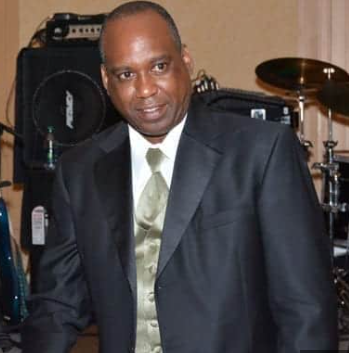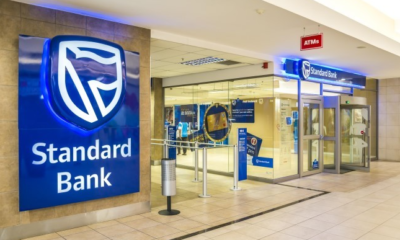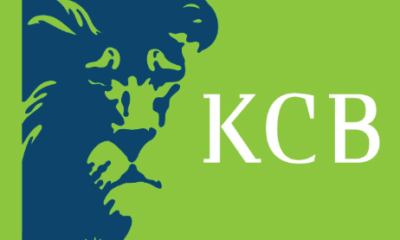The Entrepreneur
Once Richest Kenyan in the US Emerges from Retirement
Baltimore state in the US had an eponymous holiday named after him courtesy of his business acumen that saw him ranked the 41 richest black person in the US.
Published
4 months agoon
By
admin
“A lot of times, people will start a business without doing research and then wonder why it fails.By research, I mean, if you want to open a restaurant, you have to go talk to people who own restaurants. It’s amazing that we Kenyans are so shy about picking up a phone and going to talk to someone with specific questions. People will tell you how they became successful. “Talk to people and listen to how they did it and you will learn different things,” says David Karangu.
Becoming a dollar millionaire at the age of 30 earned David Karangu a place at the table owned by an illustrious clan of 5.3 million households drawn from the largest economy in the world with a net worth of 1 million U.S. dollars and more.
The year was 1997. The Place: Augusta-Georgia. The number of U.S households passing the one million dollars threshold –101 million.
Ten years later, after earning his millionaire stripes, Karangu sensationally retired from his daily grind, selling his entire business to revel in his next earthly adventure that includes globetrotting and building luxury homes.
And if you want to appreciate the sacrosanctity of time, coalescing around Karangu, you will appreciate whatCarl Sandburg meant when he commented, “The common man is not concerned about the passage of time, the man of talent is driven by it.”
Karangu manifests a time discipline that plays to a pulse similar to that of a military regiment.
On a certain day of the week since his arrival back to Kenya last May he meets up with disparate professionals who are involved in some ways in his businesses -with each group seemingly allocated time for engaging. And if one is running late, Karangu is not averse to dialing the digits of a latecomer; politely informing them a meeting has already begun.
From his telling, he’s currently involved in some real estate projects inMalindi where he has bought some serious acreage of land.
Understandably, he’s jittery having his story run – for now, for very obvious reasons, he prefers to court anonymity with a vengeance – and if you were expecting to see a current photograph of his – you will have to wait until the cows come home.
But your correspondent reminds him of the Parable of talents – and assures him that He, who lives in the firmament, is certainly proud of him.
The rest is history.
“ Where most business people make a mistake is when they become too attached to a business,” says Karangu, whose judgment call, influencing him to call it a day at the age of 40 led the Columbia Business School to write a white paper sponsored by the US Government called “The Owner’s Journey,”
The Paper interrogates eight successful entrepreneurs, including Karangu, who nurtured and grew their businesses, then unwittingly wrestled with Cognitive dissonance as they routinely faced a lackadaisical lifestyle that upended the adrenaline-driven modus vivendi that they were so accustomed to.
It includes first-hand accounts of their experiences shared, lessons learned, and reflections on what they could have done differently.
In the case of Karangu, as the days and nights unraveled, paving the way for a fresh year, another year, and almost another year, he raised the white flag. An unquenchable hankering for the business he first fell in love with when he was 18 years old, namely that of running a car dealership, was seductively strangulating his pulmonary veins.
Undoubtedly saying that Karangu is loaded is an understatement, this man has the chops for minting money and one would be forgiven for wondering if this Kenyan – American ever considered becoming a venture capitalist.
And he badly needed to breathe again.
On July 14, 2010, he purchased the former Steve Rayman Chevrolet South dealership, the biggest in Georgia, attracting unprecedented recognition by both the state government and the business community, and renamed it, Ivory Chevrolet. Then on April 2, 2012, he purchased Sutherlin Mazda, signaling the beginning of a new chapter in the auto industry.
He went on to own a BMW dealership in Columbia, South Carolina, followed by Volkswagen and Subaru dealerships in the same state.
In 2013, Karangu, then 46, became the first African immigrant to make it to the coveted list put out byBlack Enterprise Magazine(BEM).
“As the owner of one of the top-grossing metropolitan Atlanta-based businesses, he joins a small but significant list of iconic African-Americans who shape the economic landscape of this country,” read the magazine’s annual report.
The magazine honors men and women with a proven record of prudent money management and the use of technology in business.
It also highlights companies in which individuals have at least 51 percent of controlling shares, if they are listed in a bourse
“A lot of times, people will start a business without doing research and then wonder why it fails. By research, I mean, if you want to open a restaurant, you have to go talk to people who own restaurants. It’s amazing that we Kenyans are so shy about picking up a phone and going to talk to someone with specific questions. People will tell you how they became successful. “Talk to people and listen to how they did it and you will learn different things,” says Karangu.
Undoubtedly saying that Karangu is loaded is an understatement, this man has the chops for minting money and one would be forgiven for wondering if this Kenyan – American ever considered becoming a venture capitalist.
His thoughts about the proposal are well thought out.
“That’s a good question. What always happens is that people come to me with ideas that I call half-baked. People will come up with ideas without having done their research. For example, if you come to me and say, “We will make a lot of money opening a radio station in Kenya,” I will ask, “What kind of research have you done?”
And then someone will say, “There are a lot of people who listen to radio stations in Kenya,” and the next question I will ask is, “Where is your data?” Where are the numbers? Just like anyone else will ask you. Someone will say, “I don’t have that,” And I will ask, “How do you know the business will be successful?” Someone will say, “I think it will be successful.”
The other request that I usually get is, “I have this idea and I want to do it,” I will then ask, “How much money are you putting in?” And someone will say, “ I am not putting in any money.” Are you still going to keep your day job, I ask? ” ‘ Yes’ what are you risking? Nothing!”
“But if somebody is really committed, for example, if someone asks you to invest half a million dollars and they choose to do it part-time, they will certainly not be successful.” But if you are committed, believe in the idea, and are willing to give up your day job, then this is something I would look into.
But what I find about so many people is that their commitment is not there. If I’m going to do the research, I might as well do the business myself. If you have a concept, I will say to develop the numbers. Numbers don’t lie. “If you are truly committed, other people will believe what you believe, and that is what happened to me.”
In his telling, Karangu says other qualities needed to push one to succeed in business include a liking for people, embracing a circumspect attitude while hiring human capital and possessing money management skills.
As of 2021, an estimated 2% of black households in the U.S., or roughly 340,000 families, had a net worth of over $1 million, according to the economic state of Black America report. In comparison, more than one in every seven White households had surpassed the million-dollar mark.
“Wealth flows through us, not to us,” says J.D. Smith, author of Financial Distancing: How to Economically Quarantine Your Wealth, in an interview with BEM. “We shouldn’t be six feet apart when it comes to building wealth.”
He continues, “We are constantly transferring money from one institution to another.” We go to school and have to take on additional jobs to fund our education and overall living expenses. Money typically goes from our jobs to the education system. And this pattern doesn’t stop after graduation.
When we get into the workforce, money often flows from our jobs to pay hefty mortgages and student debt payments to keep up with the lifestyles of our colleagues. “We need to allocate more money toward investing if we want to build wealth.”
As of 2021, there are roughly 11.8 million millionaires in America, making up roughly 3.5% of the population.
It turns out, the journey to the U.S. for Karangu, once associated with the 26th largest minority-owned car dealership in the U.S according to the BEM- with annual sales hitting over $100 million, is traceable to his father, Dr. Mwangi Karangu, a beneficiary of the Kennedy Airlifts who ended up becoming an egghead at Morgan State University.
“ I got started when I was 17 years old. That is when I relocated back to the US from Kenya. People who knew me then in Baltimore will tell you that I used to walk around saying, “I will be a millionaire bef“ I got started when I was 17 years old. That is when I relocated back to the US from Kenya.
People who knew me then in Baltimore will tell you that I used to walk around saying, “I will be a millionaire before I’m 30 years old.” And they would say. ‘ That Karangu kid is crazy ’.But this is something I badly wanted to become more than anything else. “So, retrospectively,” Karangu, 54, says, “the first personal quality one needs to have in order to achieve success in business or indeed in any other sphere of life is ambition.”
According to Entrepreneur magazine, “Self-belief is the foundation of success.” This is an iron rule. Nobody ever became unreasonably successful without a strong belief in themselves…. Self-belief must ultimately become specific to the field in which you will ultimately triumph.
Belief in your destiny will fizzle and fade without a clear idea of the stage on which your success will be played out. “Nobody reaches a target without defining it and believing, –sometimes naively and to almost universal ridicule – that it is attainable.”
In his telling, Karangu says other qualities needed to succeed in business include a liking for people, embracing a circumspect attitude while hiring human capital, and possessing money management skills.
“You have to know how to hire and keep discipline.” This is one talent you must have. People’s relationships are crucial. For example, how does one deal with their customers? The other area where people fail is managing money.

This is where education and going to college come in. In business, the first thing you learn is that profit and cash are two different things. If you are not managing your money properly and there is a lot of cash tied up in inventory, you can be cash-poor, and this phenomenon affects a lot of people. “Managing money and managing people are the two biggest things that can make or break a sale,” says Karangu, who was born in 1967 in a U.S hospital.
And being disciplined says Karangu is an attendant quality that one requires to be successful in business.
“One requires undivided discipline; I worked every week 70 to 80 hours, not because I had to but because I took my business extremely seriously.” He added, “When it comes to business, I’m very strict; I do not hire people because they are my friends, as I have always protected my reputation and my integrity,” says Karangu.
Back in the United States, he is arguably the only Kenyan progeny to have a calendar day named after him, as evidenced by the Mayor of Augusta, Georgia, declaring July 28, 2005, “the David Karangu Day.”
In addition, the bureaucrat also awarded this entrepreneur, widely thought to have been one of the top ten business operatives in the ancestral home of the Hardest Working Man in Show Business with an Honorary Key to the city.
While the Governor of the State of Georgia appointed Karangu to the board of the second-largest hospital in the State, for a period of three years.
Understandably, these accolades singularly underline Karangu’s unvarnished pedigree as an influential entrepreneur back in the States.
His first job upon completing his undergraduate studies at Morgan State University—with degrees in accounting and marketing – was that of a dishwasher at a large pancake franchise, which he considered tedious.
Initially, he had set his mind on becoming a lawyer, but gradually, his innate intuition directed him to the sales profession.
“It was something I just sort of fell into,” says Karangu, who, on exiting the pancake franchise, got employed by the Ford Motor Company where he stayed for eight years, ascending through the ranks.
“I discovered it was something I really enjoyed,” he says.
Soon after learning the ropes, he started dreaming of owning his own dealership and began building a nest egg for that purpose.
After saying goodbye to Ford in 1995, he enrolled at the National Automobile Dealers Association Academy – a prerequisite requirement for all car dealers in the U.S., while also working as a sales manager at a Lincoln dealership in Melbourne, Florida.
Ford Motor Company owns Lincoln Motor Company and acquired the company around 1922; it’s a luxury vehicle division of Ford.
“When I started my business, I really knew this was what I wanted to do.” I did my research and was able to show hard numbers. I left a job that was paying me over $ 120,000 a year to start a business.
The first year I made $40,000. This brings me to another point. You better get married to someone committed to the ups and downs of business. Imagine going from $ 120,000 to $40,000! Or moving from a nice four-bedroom house to an apartment. “These are the sacrifices you have to make when you are getting started,” he says.
For a while, after he completed the course, he had nothing to do but wait for the right opportunity to come along.
But after learning the ropes, he started dreaming of owning his own dealership and started building a nest egg for that purpose.
The thought of starting his own business didn’t worry him, but the waiting was driving him crazy.
“I had always loved cars since I was a little boy.” “During my stint as an employee, I made up my mind that the automobile industry was going to be part of my future,” he reportedly told the Kenya-based Nation newspaper.
Verifiably his entrepreneurial journey leading to his present-day financial freedom began in Augusta – Georgia.And it was anything but bliss. For he faced the ubiquitous travails faced by bootstrapper entrepreneurs.
Listen up as Karangu narrates his initial obstacles.
“ Let me walk you through.” I was working for the Ford Motor Company, and I was comfortable doing what I was doing. Then I decided I wanted to go out and do something else for myself. I couldn’t think of anything at the time. But at night, I’d see all these informational commercials on TV about buying houses and becoming a millionaire. Guess what? I bought into this stuff.
I realized that you could get rich this way. The next thing that I did was to identify the business I wanted to engage in. And I identified that I wanted to buy an automobile dealership. And I went to the people in the industry that I knew, and they turned me down. They asked me, “How old are you anyway?” I said “ 25 years.” And they said, “Get another 15 years before we can take you seriously.”
Then I went to a bank. I will never forget when I went to SunTrust Bank with a nice package prepared, and the guy in the bank did not even open the package. After this, I started reading biographies of rich people. And the one thing that stuck out was partnerships. I had 150 clients. My clients were mainly car dealers.
I thought to myself, “Out of the 150 people, there must be someone out there whom I can partner with.” As I went through my day job, I would ask those I was close to, “What do you think of you and I starting a business together? “ Eventually I ended up with a list of three people. The last person I talked to said to them, “Look at this, give me the capital to get started.”
“I will own 51 % of the business; you do not have to do anything.” I will do all the work, and you will own 49 % he said, “What are you giving up? I will give up my house. “I will give up my 410 K plan.”
Admittedly, Karangu got his big break when a friend in Orlando told him of the opportunity at Fairway Ford, a six-acre lot off Washington Road in the booming bedroom community of Evans.
Mr. Karangu saw potential in the dealership. It was modern looking, in a prime traffic location, and had an upper-income customer base.
He quickly purchased it using his savings and a line of credit through Ford Motor Co., which he used to leverage a bank loan.
According to Wealthy Gorilla, there are conceivably seven sacrifices that entrepreneurs need to make for them to succeed in business and verifiably Karangu ticked on all of the boxes.
Should one be interested in pursuing a business, what advice would Karangu give to, say, a putative entrepreneur?
Says Karangu, “There are so many businesses you can do.” But you have to narrow them down. And the best thing is always to engage in something that you are familiar with. And a lack of seed capital should not be a hindrance.
“I will normally tell anybody that I started off with no money.” I came to the US just like anybody else. Yes, I was fortunate to have brothers and sisters but none came to me and said ‘ here is a batch of money go and invest in a dealership’. There is no easy career in this world. I started going to business conferences and I started talking to people who were doing what I wanted to do.
And I heard their stories. I was also able to meet people who finance businesses, and I was able to grow that way,” says this alumnus of Nyeri High School who in 2013 was ranked the 41st richest black entrepreneur in the U.S.by BEM.
Then on November 1, 1997, he launched his first dealership – Fairway Ford of Augusta, in Georgia, at age 30, becoming the youngest dealer of the Ford Marquee in the United States, a milestone that led him to bag the Ebony Magazine 2001 dealer of the year award.
Is there a magic bullet in business?
Hear him speak: “ If you want to be a doctor, you have to go to school. You have to read and research. A lot of times people will start a business without doing research and then wonder why they failed. By research, I mean, if you want to open a restaurant, you have to go talk to people who own restaurants.
It is amazing that we Kenyans are so shy about picking up the phone and going to talk to someone with specific questions. People will tell you how they became successful. Talk to people and listen to how they did it. And you will learn different things.”
In 2002, aged 35, his Atlanta-based motor dealership company, the Ivory Chevy Auto Group, was ranked among the largest minority-owned enterprises in the U.S., grossing over $100 million in sales annually – an equivalent amount to what today the world’s largest software and programming company – is spending, over the next five years, to open an Africa technology development center with sites in Kenya and Nigeria.
And his appetite for motor vehicle dealerships, it seems, was headed north with each passing year.
Interestingly, while growing up here in the motherland, he intuitively developed a passionate love for the Mercedes Benz brand, believing that cars bearing the three-pointed stars marquee were the world’s ultimate ride.
Coincidentally, on July 1, 2005, Karangu, opened a Mercedes Benz dealership, which became the crown jewel of his new empire. From the word go, it was a shoo-in, setting new records for a Mercedes dealership, as the entrepreneur emerged as one of only five African Americans in history to own one.
After a hiatus of 12 years, meanwhile, the old man and his fledgling family relocated back to Kenya in 1972.
It would also be the first time the younger Karangu would be setting foot in the motherland having been born in 1967 in the U.S.
However, Karangu’s visit to his forbearer’s home ended up being a sojourn.
In 1983, the older Karangu, together with his brood, relocated back to the U.S. upon accepting a job at Morgan State University, with the move arguably prompted by the political uncertainty submerging Kenya at the time.
Tellingly, two unsavory events had taken place in Sub-Saharan Africa’s third-biggest economy back in 1982, including an attempted coup and the abrogation of plural democracy. With the duo acts, in effect, smothering the working of a functional democracy, precipitating a palpable edginess in the national psyche.
Understandably, the times were fraught with trepidation as Kenya, seemingly appeared to be barreling towards an aberration of what the Roman goddess Libertas symbolized in the iconic Statue of Liberty found in the Big Apple.
Arguably, the lecturer’s perception of uncertainty was sufficient reason for him to return to his beloved home.
The Washington Post nicely captured the mood engulfing Kenya at the time, reporting that “Since he came to power in 1978,( President) Moi has weathered a reported assassination plot, a bloody Air Force coup attempt, a sharp drop in Kenya’s economy, and, by his own recent account, the recognition of “evil-minded people” in his government who are holdovers from( President) Kenyatta’s days in power.”
In addition, the Paper reported that by calling parliamentary elections a year in advance (1983) “in order to clean the system,” Moi has indicated to Kenya’s 7.2 million registered voters that it would serve their local interests to elect members of Parliament closely identified with him and to reject any incumbents who are likely to be “disloyal.”
Generally, the world was also witnessing several seminal events happening in 1983, including the unveiling of the first mobile phone, the U.S invading the Caribbean Island nation of Grenada, and the beginning of a civil war in Zimbabwe. The world was in a capricious mode.
It was also a watershed year for this East African state because it was holding national elections.
“It turns out, the 1983 elections were called by Moi a year early to dissipate a crisis which had emerged following the naming of Charles Njonjo as a traitor and his dismissal from the cabinet and the (ruling Party KANU) party.
Two reasons led to this decision. First, Moi hoped that the elections would serve a legitimizing function and restore confidence in a severely weakened presidency following the abortive coup of August 1, 1982. Second, the elections were utilized to focus public attention away from the serious economic problems which the country faced,” says Dr. Ahluwalia Davinder Pal Singh, a political scientist.
And for a person whose worldview had disproportionately been shaped by the thinking behind a coterie reverently referred to as an Assembly of Demigods, it was arguable that Dr. Karangu’s fidelity to the second paragraph of the United States Declaration of Independence was sacrosanct.
Indeed It so happened, the Kenya of the 80s and 90s was predatory, retaliatory, and uncharitable in character, particularly towards adherents of libertarianism but also generally toward that anonymous man on a Kenyan street who dared to believe in the doctrine of all persons having inalienable rights.
Over the years, the younger Karangu has been involved in philanthropic work both in the US and in Kenya earning him for example the local state award of Moran of the Burning Spear (MBS) in 2012.
What does Karangu think of his storied entrepreneurial journey?
“At that time, for the last 10 years, we had made a lot of money before I decided I wanted to do something on my own.” That’s when I went and bought the dealerships. Right now, banks approach me and ask if I want money, and I tell them no, recalling the times when no one would speak to me.
But it is because I did not have a proven record then. But all I will tell you is that a strong idea always prevails, even in situations where money is lacking. In my case, the idea was more powerful. Think about it—even in Kenya, when someone gets started, who gives them money?”
Maya Angelou would also echo this truism, saying, “You can only become truly accomplished at something you love.” Don’t make money your goal. Instead, pursue the things you love doing, and then do them so well that people can’t take their eyes off of you.”
Karangu put in the hours, working 12 hours a day, six days a week, meaning, the guy did not have time for a social life which leads one to ask the question of whether hard work alone is the panacea leading to business success.
“A good plan comes first.” The love of what you are doing is secondary; you would do it for fun. “Hard work follows along with a little luck,” he says.
Karangu, without a doubt, is the person who became a Croesus through sheer personal grit and self-belief. As a millionaire, his advice is indeed worth heeding.
His parting shot is, “Read about other successful people and surround yourself with positive people.”
You may like
-


Biggest Africa Lender Plans Kenyan Bank Acquisition by 2025
-


Cooperative Bank of Kenya Headed for Strong Growth, Analysts Say
-


Equity Bank Group named Strongest Banking Brand in Kenya
-


KCB Group Posts 40 Billion Shillings, Marking a 19.5 % Rise in 2022
-


KCB Group Talks With Potential Targets in Plan to Enter Ethiopia
-


Lawmaker spends a day working as baggage handler, barista



















